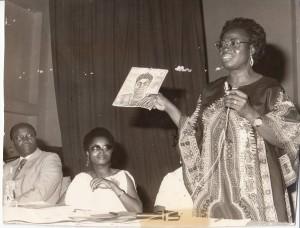
Folayegbe Akintunde, Women activist and senior civil servant of the old Western region of Nigeria; counted among the administrative elites of the early post-colonial Nigeria. Folayegbe was the oldest daughter of a leading Christian family in Okeigbo, descendant of the old Oyo war-time settler at Ife, and Ogbomoso settler at Ibadan, who both camped in Okeigbo from the mid-19th century. Folayegbe was born in 1923. As a child, she displayed uncommon intelligence with her insistence on continuing her education, against the norm of the time among female children. With the support of her CMS School headmaster she was able to convince her father, a cocoa farmer. At the age of fifteen, Folayegbe gained a scholarship to study at Queen’s College in Lagos.
Folayegbe battled with a feeling of inadequacy in the new big city she had come to, and became homesick. Soon, she developed interest in the intellectual life of the elite school. She enrolled in a year-long teacher training course at the United Missionary College in Ibadan after passing the Cambridge Senior Certificate Examination in 1941. After the training, Folayegbe began teaching at the Methodist High School in Lagos. In 1949, she applied for, and received a government scholarship, obtaining in the end, a teacher’s certificate at the Institute of Education in London. While in London, she also completed a degree course in economics, working during the daytime and vacations while taking classes at night. She was able to obtain a scholarship from the colonial government too, later in the program.
As a student, Folayegbe took part in campus politics, rising to the position of the Vice President in the West African Student Union where she came under the influence of the duo Margaret Ekpo and Tanimowo Ogulesi who had come for the London constitutional conference in preparation for Nigeria’s independence. Her experience in this position would prove significant in her life’s journey as she had resolved shortly before her return to Nigeria to dedicate herself to helping women find their place in the rapidly changing society. In 1954, she obtained an advanced degree for which she prepared for a career in the Nigerian Civil Service. Same year, she got married to a two-year older accountant, Aghedo Ighodalo and had her first child.
In her job, Folayegbe joined in mapping operations for public service in northern Nigeria. From 1964 when she became an undersecretary, she had gotten invitation to speak at local and international conferences and seminars on topics bordering on women. She will reach the zenith or so to speak, of her career in the Western region civil service in 1968 when she was appointed Permanent Secretary of Home Affairs and Information. This makes her the first woman to be so elevated, though only at the regional level, and the first female federal Permanent Secretary will not emerge until another seven years; Francesca Yetunde Emmanuel who does not share in the enthusiasm for women emancipation. After her retirement in 1976, Folayegbe took to poultry farming and wrote extensively on many subjects concerning women. She announced marriage was no longer a barrier for women to have gainful employment but cautioned wives not to neglect their homes. Folayegbe bemoaned the hypocrisy of male politicians who pay lip service to women emancipation. Rather than rely on statutory solution which she is convinced would never come from them, she proffered that females must strive to attain even a higher standard of efficiency than men aspire.
With precedence set by forerunners like Oyinkan Abayomi and Kofoworola Moore in the ‘30s, Folayegbe seemed at the beginning of her advocacy to have come upon a golden era of women emancipation. With hindsight she had hinted a lot more had to be done. In old age she grew even more pessimistic, expressing her disappointment with the pace of Nigeria’s development, and bemoaning the lack of credibility among many in the new generation of women leaders. She became late in 2005.





















